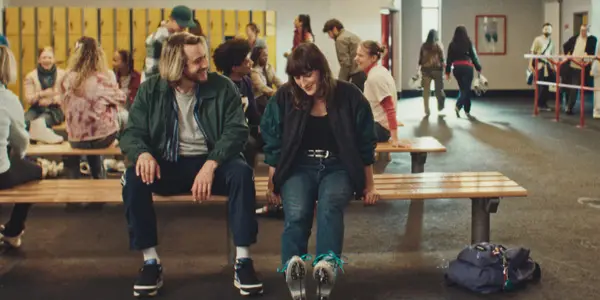In what feels like a very natural fit, I’ll be pairing together two of the festival’s opening films as part of my Cannes 2025 coverage: Leave One Day (Partir un Jour), the festival’s opening film at large, and Enzo, which opens up the festival’s sidebar Directors’ Fortnight program. Neither film served as the strongest start to this year’s festival, but both have interesting elements to them nonetheless.
Leave One Day (Partir un Jour)

Marketed as a musical dramedy, Amélie Bonnin’s feature directorial debut is the type of film that seems to lack a clear identity of its own. Leave One Day (Partir un jour) does have some delightful moments, but it unfortunately lacks any cohesive framework to create any compelling storytelling. A rather muted experience that likely had the potential to be creatively charged if handled differently.
Based on Bonnin’s own 2021 short film, Bye Bye, Leave One Day follows Cécile (Juliette Armanet), a renowned chef who returns to her hometown in rural France after learning that her father (François Rollin) suffered another heart attack. Helping out at the family’s local restaurant while her father recovers, Cécile also reconnects with an old flame (Bastien Bouillon), all while juggling with some unexpected life changes of her own.
Armanet, a popular singer in France, is naturally a good fit as Cécile, and does well even outside of the film’s musical scenes. Portraying a strong-headed career-driven woman who yearns for a life bigger than what her small town could offer, Armanet somehow avoids being overly familiar, despite depicting a characterization we’ve seen time and again. The film’s comedic moments are also quite poignant, with a lighthearted tenderness that befits the narrative’s small roots origins. Its dramatic moments, however, aren’t nearly as effective, with tonal shifts that seem to lack intensity, and are far too brief to be impactful.
And much like the film’s musical numbers, which feel fleeting and sporadic, Leave One Day‘s narrative arcs also come and go in a manner that often feels nonsensical. Bonnin’s rather loose narration provides a sense of excitement to the film’s storytelling style, but ultimately stalls in its ability to convey anything of real substance. Ideas come and go and rarely stay long enough to resonate on an emotional level. In a similar manner, the film is also skimpy on its musical numbers and doesn’t necessarily establish itself as a part of the genre. The musical aspect of the film seems peripheral rather than a central part of the storytelling process.
If Bonnin was trying to redefine our expectations of the musical genre, this was likely not the best way of doing that. Beyond not really feeling like a musical at all, there’s little else that separates (or elevates) it from musicals that came before it. Perhaps the ineffectiveness of its musical elements is what disengages the film from its more emotional and dramatic notes, leaving behind some scattered remnants of a romantic comedy that lacks clear direction. A somewhat enjoyable, though ultimately lackluster attempt at challenging the musical genre.
Enzo
Crafted with the intentions of being a nuanced coming-of-age story about a teenage boy discovering his own identity, Robin Campillo’s Enzo ultimately struggles to find any real breath of fresh air. Eloy Pohu shines in a remarkable debut performance, but the film leans too close to convention, rather than breaking free towards newer ground.
Trying hard to separate himself from his upper class family, 16-year old Enzo (Pohu) works hard to excel at his masonry apprenticeship. On the job site, he meets Vlad (Maksym Slivinskyi), an older Ukrainian construction worker, who takes him to social circles outside of his usual comfort zone. Enzo’s defiance worries his parents (Pierfrancesco Favino and Élodie Bouchez), who yearn for a much different life for their adolescent child.
Right at the outset, it’s clear that Campillo crafted the film with a quiet and restrained approach to storytelling in mind. Despite being a tale about a troubled teenager, the film manages to avoid the usual melodramatic tropes that usually befall these types of stories. Instead, Campillo’s choice of narration almost mirrors Enzo’s uncertain inner dialogue, creating a lack of clarity that complements his thematic journey. Pohu also carries the film with ease, which is no easy task for a new performer. It’s a thoughtful and quiet performance that hangs comfortably in the subtle background while also jumping to the foreground when needed.
What’s lacking in Enzo is a clear sense of ingenuity that sets it apart from countless other tales traversing similar subject matter. There’s nothing glaringly bad about the film, but not being creatively sound feels almost equally as offensive. With obvious talent both behind and in front of the camera, the film just never takes off in a manner that feels emotionally engaging. The narrative offers a lot to dissect, but any examination feels cursory at best. In a sense, the film simply passes through a wreckage of emotional baggage rather than tackling it head on.
Enzo does feature superb performances — particularly from newcomer Eloy Pohu — and Campillo impresses with his patient and unassuming approach to storytelling. The sum of its parts, however, doesn’t add up to anything we haven’t already seen before.
Does content like this matter to you?
Become a Member and support film journalism. Unlock access to all of Film Inquiry`s great articles. Join a community of like-minded readers who are passionate about cinema - get access to our private members Network, give back to independent filmmakers, and more.